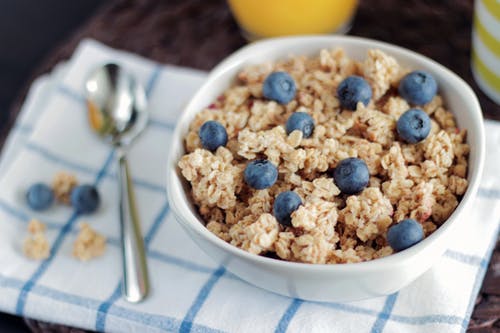By Kenda Hettinger a recent ASU Nutrition Student
Gut microbiome is all of the microorganisms contained in our gastrointestinal tract. There are trillions of them in there. They are so small you need a microscope to see them, but collectively they weight about 2 – 5 pounds. Some are known to cause uncomfortable symptoms, but most are there to keep the bad ones at bay and to benefit our bodies. It used to be thought that you first started to grow your microbiome when you came into contact with your mother’s birth canal as you’re being born, but more current research from Science Translational Medicine suggests that the placenta contains its own unique set of microbiome.
What the microbiome does for us
It helps your immune system by first forming a barrier effect, not letting bad bacteria, viruses, or fungi enter your blood, but then it also communicates with your immune cells to determine how your body reacts to the bad organisms.
We know that a diet high in fiber and probiotics is essential for a healthy microbiome. Together these three aspects are shown to lower your blood lipids, help control your glucose and insulin response, keep your bowels regular, control hunger and weight, and lower your risk of certain types of cancer such as lung and colorectal.
How to help your microbiome flourish
Try to avoid antibiotics. Antibiotics kill any and all bacteria, even the good bacteria in your gut. Although they may be necessary at times, people have been known to overuse antibiotics. The next time you are sick, let your doctor know that you are trying to avoid all unnecessary antibiotics and see if there is another form of treatment.
Avoid artificial sweeteners. A study published in 2014 shows how artificial sweeteners alter your gut bacteria and affects your insulin resistance.
Consume a diet high in prebiotics and probiotics. Probiotics are good bacteria that your gut needs for a healthy microbiome. Prebiotics are substances that come from fiber that your healthy bacteria eats. You can think of it like Prebiotics help the good bacteria (probiotics) grow and flourish so that that the bad bacteria do not take over.
Where to find probiotics
- Yogurt
- Keifer
- Sourkrout
- Tempeh
- Kimchi
- Miso
- Kombucha
- Pickles
Remember when picking foods to add to your diet for the probiotics, that probiotics need to be kept cold. So look for these foods in the refrigerated section. Some things like pickles and sourkrout can be found refrigerated or not. You want to make sure you get the refrigerated one and then eat it cold.
Where to find prebiotics
- Onions
- Leeks
- Garlic
- Asparagus
- Berries
- Legumes, beans, and peas
- Bananas
- Oats

In conclusion, your gut microbiome is very important to help you maintain your weight, regulate your insulin resistance, lower your cancer risk, fight off diseases, have regular bowel movements, and lower your blood lipids. You should consume a diet high in fiber and probiotics to keep your gut microbiome in its best health.
For more recipes like this one check out our recipe section. Check out the produce section to find out what produce is in season.
Resources
Aagaard, Kjersti, Jun Ma, Kathleen M Antony, Radhika Ganu, Joseph Petrosino, and James Versalovic. “The Placenta Harbors a Unique Microbiome.” Science Translational Medicine 6.237 (2014): 237ra65. Web.
Slavin, Joanne. “Fiber and Prebiotics: Mechanisms and Health Benefits.” Nutrients 5.4 (2013): 1417-435. Web.
Jae Jeong Yang, Danxia Yu, Yong-Bing Xiang, William Blot, Emily White, Kim Robien, Rashmi Sinha, Yikyung Park, Yumie Takata, DeAnn Lazovich, Yu-Tang Gao, Xuehong Zhang, Qing Lan, Bas Bueno-de-Mesquita, Ingegerd Johansson, Rosario Tumino, Elio Riboli, Anne Tjønneland, Guri Skeie, J. Ramón Quirós, Mattias Johansson, Stephanie A. Smith-Warner, Wei Zheng, Xiao-Ou Shu. Association of Dietary Fiber and Yogurt Consumption With Lung Cancer Risk. JAMA Oncology, 2019; DOI: 10.1001/jamaoncol.2019.4107
Palmnaes, Marie, Theresa Cowan, Marc Bomhof, Juliet Su, Raylene Reimer, Hans Vogel, Dustin Hittel, and Jane Shearer. “Low-Dose Aspartame Consumption Differentially Affects Gut Microbiota-Host Metabolic Interactions in the Diet-Induced Obese Rat: E109841.” PLoS ONE 9.10 (2014): E109841. Web.

